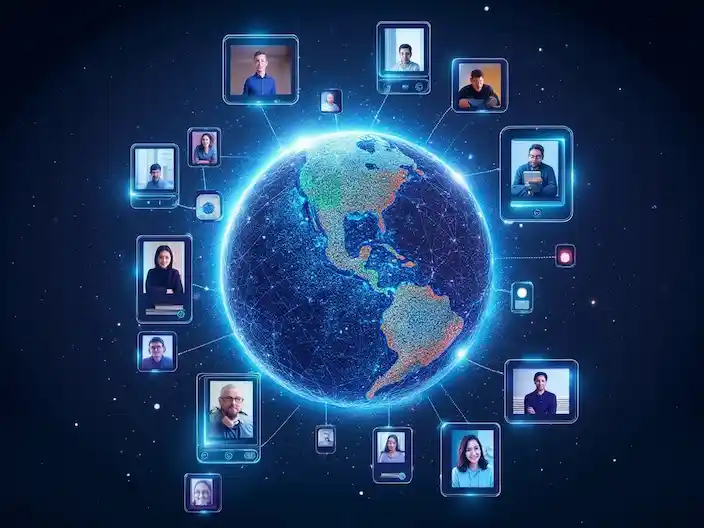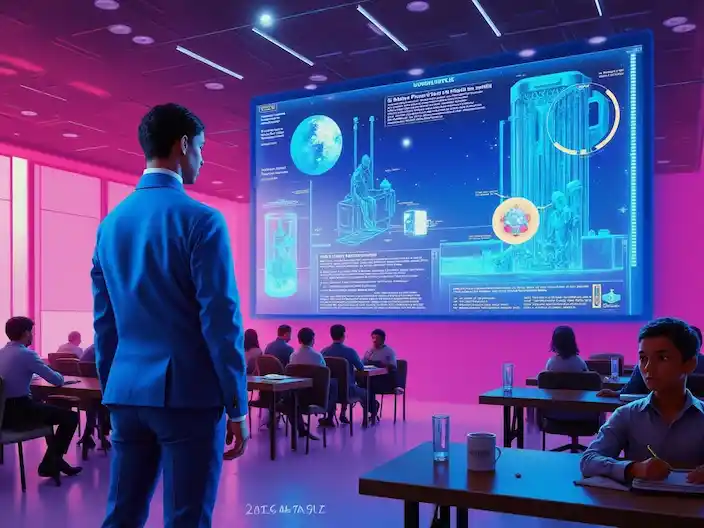- Introduction
- Economic Impacts
- Improvement of Transactions and Cryptocurrencies
- Transformation in Blockchain and Digital Economy
- Transparency and Trust in Metaverse Economy
- New Economic Applications in the Metaverse
- Data-Driven Economy
- Digital Trade and Assets
- Economic Challenges and Solutions
- Applications of Quantum Computing
- In Metaverse Healthcare
- In Metaverse Education
- Multifaceted Advancements
- Challenges and Opportunities in Healthcare and Education in the Metaverse
- Challenges
- Opportunities
- Ethical Considerations and Legal Challenges
- Privacy and Data Protection
- Abuse of Quantum Technology
- Social Impacts and Digital Justice
- Global Laws and Digital Ownership
- Practical Solutions to Address Ethical and Legal Concerns
- Conclusion
- Summary of Findings
- Suggestions for Future Research
Introduction
With the rapid advancement of digital technologies, the integration of quantum computing into the metaverse not only redefines existing challenges but also provides unprecedented opportunities for the development of this digital ecosystem. In the first part of the article, the importance of these two technologies and their challenges and opportunities were discussed. Now, in part two, the focus will be on the more technical details and practical applications of quantum computing in the metaverse, including its role in enhancing security, optimizing the economy, and enabling advanced simulations and applications.
This section also provides a clear outlook on the future of the metaverse and its infrastructural needs by examining the security threats posed by the computational power of quantum computers and resilient solutions against these threats. The combination of these technologies could create an environment where not only users’ digital experiences are improved, but the transformation of data and transaction security reaches new levels.

Economic Impacts: Improvement of Transactions and Cryptocurrencies
One of the most critical aspects of the metaverse is its economic systems, which often rely on digital currencies and blockchain. Quantum computing, by providing powerful tools for optimization and security, has the potential to profoundly transform the metaverse economy. This transformation can not only increase the speed and efficiency of transactions but also strengthen the trust of users and investors in these systems.
- Improving Financial Transactions in the Metaverse
- Transaction Processing Speed
Quantum computers can solve complex algorithms at much higher speeds than classical computers. This could lead to:
- Reduced Transaction Confirmation Time: In current blockchains, transactions may take time due to technical limitations. With quantum computing, this time is significantly reduced.
- Increased Scalability: Financial networks in the metaverse can process more transactions per unit of time, which is crucial for environments with large user bases.
- Reducing Transaction Costs
By optimizing data processing, quantum computing can lower the costs associated with financial transactions. This would benefit not only users but also businesses operating within the metaverse.
- Transformation in Cryptocurrencies and Blockchain
- Quantum-Resistant Blockchains
One of the major concerns about current blockchains is their vulnerability to quantum computers breaking cryptographic algorithms. New quantum-resistant cryptographic technologies could solve this problem and enhance the security of blockchain systems.
- Increased Transaction Security: Advanced cryptography can prevent data theft and cyberattacks.
- Building Investor Trust: Enhanced security enables users and investors to use digital currencies with greater confidence.
- Development of Smart Digital Currencies
Quantum computing can contribute to creating digital currencies that use advanced algorithms for optimal performance. These currencies may have specific features, such as:
- Automatic and Smart Transactions: Currencies that can act based on predefined conditions without human intervention.
- Better Liquidity Management: Quantum computing can help with advanced market analysis and optimal management of currency supply and demand.
- Increasing Transparency and Trust in the Metaverse Economy
- Transparency in Transactions
Quantum computing enables the analysis and processing of vast amounts of data, which could help increase transparency in metaverse financial systems.
- Transaction Tracking: Users can view each transaction transparently and in detail.
- Fraud Prevention: Quantum systems can quickly identify and block suspicious activities.
- Increasing User Trust
With reduced fraud and enhanced security, users’ trust in the metaverse’s economic ecosystems will be strengthened. This could lead to more investment and faster growth of the metaverse economy.

New Economic Applications in the Metaverse
- Data-Driven Economy
Quantum computing can analyze large economic datasets with high precision, creating new opportunities for businesses:
- Market Trend Predictions: Through advanced simulations, businesses can predict market behaviors and adjust their strategies accordingly.
- Creating New Economic Models: Using precise analysis to design economic models tailored to users’ needs.
- Digital Trade and Assets
- NFT Market Development: Quantum computing can improve the security and efficiency of NFT markets, allowing users to trade their digital assets with greater confidence.
- Advanced Smart Contracts: Contracts that use advanced algorithms for automated and error-free execution.

Economic Challenges and Solutions
- High Infrastructure Costs
To leverage quantum computing, substantial investments are needed in the required technology infrastructure. International collaborations and private sector partnerships can reduce this challenge.
- Need for Legal Frameworks and Standards
The introduction of quantum computing into the metaverse economy requires the development of new laws and standards to prevent potential misuse.
Applications and New Advancements: From Healthcare to Education
Quantum computing, as an advanced technology, has unique potential for creating profound transformations in various fields, including healthcare and education in the metaverse. This technology could enable more accurate simulations, better data analysis, and enhanced learning and treatment experiences. Combining these capabilities with the metaverse will create an environment where innovations and new services significantly improve human lives.

- Quantum Computing Applications in Metaverse Healthcare
- More Accurate Disease Diagnosis and Treatment
In the metaverse, medical simulations can achieve new levels of precision and efficiency with quantum computing:
- Advanced Molecular Simulations: Quantum computers can simulate complex molecular structures at the atomic scale, aiding drug discovery and predicting drug effects.
- Human Body Modeling: Accurate human body simulations in the metaverse allow testing of treatment methods in digital environments.
- Remote Surgery in the Metaverse
- Advanced Surgical Techniques: Doctors can simulate or perform complex surgeries in the metaverse using virtual reality and quantum computing-based systems.
- Reducing Human Errors: Using quantum AI algorithms increases surgical accuracy and reduces error likelihood.
- Prevention and Management of Epidemics
- Simulation of Disease Outbreaks: Quantum computing can provide advanced models for predicting disease outbreaks and offer management solutions.
- Analysis of Big Biological Data: This technology can analyze massive biological datasets to propose better preventive methods for chronic and infectious diseases.
- Quantum Computing Applications in Metaverse Education
- Advanced Learning Environment Simulations
Quantum computing can bring metaverse learning environments to new levels of interaction and realism.
- Advanced Virtual Laboratories: Students can engage in complex scientific experiments in simulated environments, which would be too costly or dangerous in the real world.
- Historical and Cultural Simulations: High-detail reconstructions of historical events or cultural locations in the metaverse can make learning experiences more engaging and tangible.
- Personalized Learning Process
Quantum computing can create personalized learning systems tailored to the needs and abilities of each individual:
- Learning Behavior Analysis: Identifying students’ learning patterns and providing content suited to their learning style.
- Learning Data Modeling: Processing large educational datasets to predict educational needs and improve academic outcomes.
- Global Collaboration in the Metaverse
The metaverse could create global classrooms where people from around the world participate simultaneously:
- International Knowledge Exchange: Professors and experts can teach and exchange ideas virtually in the metaverse.
- Easier Access to Educational Resources: Students in remote locations can access advanced educational courses.
- Multifaceted Advancements in the Metaverse
- Professional Training and Job Simulation
Quantum computing in the metaverse could provide tools for specialized skill training:
- Industrial Simulations: Individuals can learn industrial skills like machinery repair, medical surgery, or crisis management in simulated environments.
- Soft Skills Development: Simulating human interactions to improve communication and management skills.
- Therapy and Rehabilitation in the Metaverse
Metaverse environments can serve as rehabilitation tools for individuals suffering from physical or psychological issues:
- Mental Health Therapy: Simulating calming environments and offering mental exercises in the metaverse.
- Physical Rehabilitation: Using virtual reality to help patients recover physical mobility skills.

Challenges and Opportunities in Metaverse Medicine and Education
- Challenges
- Development Costs: Quantum technologies and the metaverse still require significant investments for development.
- Lack of Adequate Infrastructure: Many regions around the world still lack the necessary infrastructure to access the metaverse.
- Ethical Considerations: The use of simulations and advanced analytics in medicine and education may introduce new ethical issues.
- Opportunities
- Global Access to Educational and Healthcare Services: Quantum computing can make services accessible to more people worldwide.
- Increased Efficiency and Reduced Costs: Advanced simulations can make learning and treatment processes faster and more effective.

Ethical Considerations and Legal Challenges
The development and integration of advanced technologies like quantum computing in the metaverse bring not only significant opportunities and benefits but also important ethical and legal challenges. These challenges can involve issues such as privacy protection, misuse of technology, social impacts, and the lack of appropriate legal standards. Below, we explore the ethical and legal considerations related to these technologies in the metaverse in detail.
- Ethical Considerations in the Development of the Metaverse and Quantum Computing
- Privacy and Data Protection
- Challenge: Quantum computing enables the collection, storage, and analysis of vast amounts of metaverse user data at high speeds. This raises concerns about user privacy.
- Ethical Issues:
- Who owns user data in the metaverse?
- How can sensitive and personal data be protected?
- Are users aware of how their data is being used?
- Solutions:
- Develop transparent data management systems.
- Create quantum-resistant encryption algorithms to protect user data.
- Misuse of Quantum Technology
- Challenge: The extraordinary power of quantum computing in data processing can be misused for unethical purposes, such as cyberattacks, identity theft, or even election interference.
- Ethical Issues:
- How can we prevent the misuse of this technology
- Should access to quantum computing be restricted?
- Solutions:
- Enforce strict regulations to monitor the applications of this technology.
- Develop international oversight systems to prevent abuse.
- Social and Psychological Impacts
- Challenge: Metaverse virtual environments, especially when combined with advanced quantum simulations, can have profound effects on behavior, communication, and even identity.
- Ethical Issues:
- Can excessive use of the metaverse lead to social isolation or psychological problems?
- How can user interaction in virtual environments be regulated to maintain a balance between real and digital life?
- Solutions:
- Develop standards for the duration and type of metaverse usage.
- Offer educational programs to raise awareness of the consequences of metaverse usage.
- Digital Equality and Justice
- Challenge: Access to advanced technologies like quantum computing and the metaverse may be limited to wealthy countries or financially privileged individuals.
- Ethical Issues:
- Will these technologies widen the gap between social classes?
- How can equitable access to these technologies be ensured?
- Solutions:
- Create international programs to provide global access to these technologies.
- Reduce costs through supportive policies and private-sector partnerships.
- Privacy and Data Protection
- Legal Challenges in Integrating Quantum Computing and the Metaverse
- Lack of Global Standards and Regulations
- Challenge: Many countries still lack comprehensive laws regarding quantum technologies and the metaverse. This legal gap can lead to widespread misuse.
- Solutions:
- Develop global standards for the use of quantum computing in the metaverse.
- Establish international organizations to oversee these technologies.
- Digital Ownership and User Rights
- Challenge: In the metaverse, digital ownership may include assets such as NFTs, cryptocurrencies, and user data. The lack of clear regulations can lead to legal conflicts.
- Legal Issues:
- Who owns digital data and assets?
- How can digital asset theft or fraud be prevented?
- Solutions:
- Define digital property rights laws.
- Develop legal systems to resolve disputes in the metaverse.
- Security Challenges and Cybercrime
- Challenge: The power of quantum computing can make current security algorithms obsolete, leading to an increase in cybercrimes.
- Solutions:
- Develop quantum-resistant encryption methods.
- Implement stringent laws to combat cybercrime.
- Governance and Oversight of the Metaverse
- Challenge: Who is responsible for overseeing activities and regulations in the metaverse? The lack of clear governance can lead to disorder and abuse.
- Solutions:
- Establish independent regulatory bodies for managing the metaverse.
- Develop legal frameworks to oversee business and social activities.
- Lack of Global Standards and Regulations

Practical Solutions to Address Ethical and Legal Challenges
- International Cooperation: Countries must collaborate in creating global laws and standards for quantum computing and the metaverse.
- Education and Awareness: Educational programs for users and developers about ethical challenges and responsibilities are essential.
- Investment in Research and Development: Investing in secure technologies and developing legal infrastructure can help prevent misuse.
Conclusion and Suggestions for Future Research
Quantum computing and the metaverse both represent major revolutions in technology. Their integration offers an unprecedented opportunity to break new ground in fields like economics, education, medicine, and even social interaction. However, to achieve these potentials, it is essential to address challenges such as data security, global regulation, and digital inequality.
Some key suggestions for future research include:
- Quantum Cryptography Research: Develop algorithms to ensure the security of user information against quantum threats.
- Complex Simulations: Study the interactive effects of quantum technology on metaverse design and its applications in areas like medicine and education.
- Legal Frameworks: Create international laws to regulate activities in the metaverse and the use of quantum technologies.
- Infrastructure Investment: Accelerate the development of hardware and software necessary for fully utilizing these technologies.
Table of Contents
Toggle


One Response